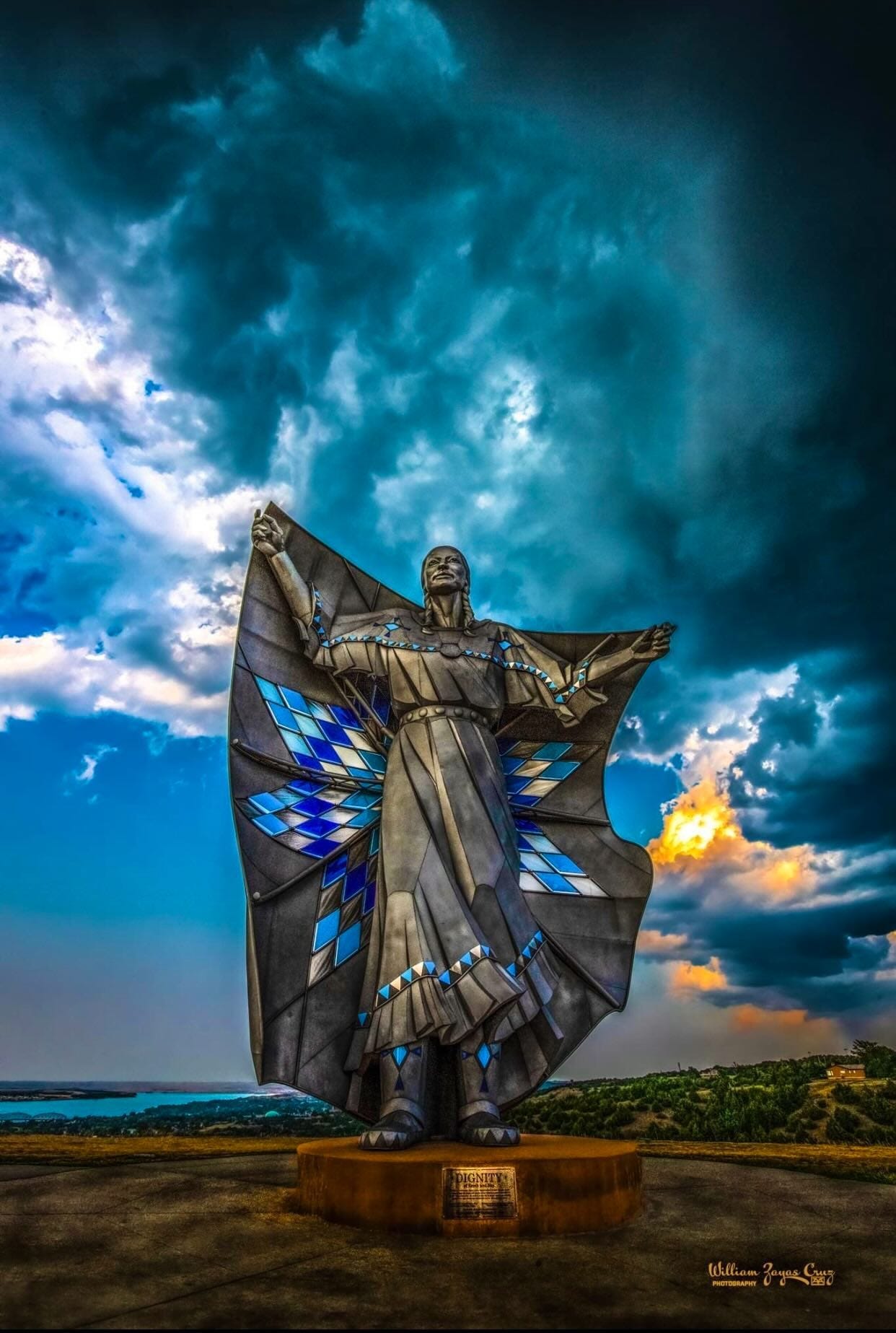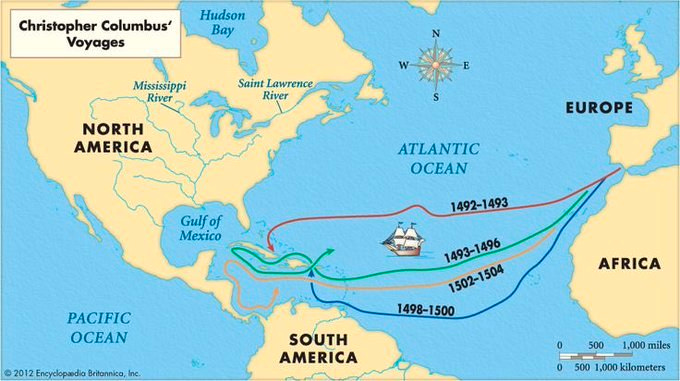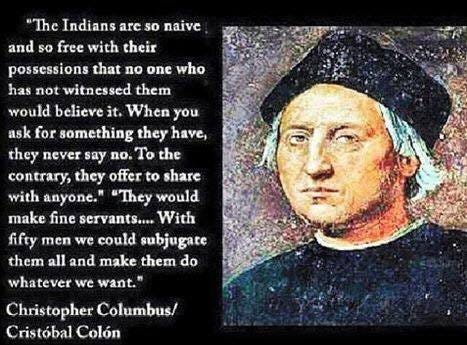Why Indigenous Peoples' Day Must Replace Columbus Day
Columbus was a historical figure who should be studied, not an icon to be honored
For many Americans, the second Monday in October brings back memories of childhood poems and classroom celebrations of Columbus Day. Growing up in the 1990s, I still recall the rhyme we were taught to commemorate Christopher Columbus "discovering" America:
🎶A long time ago in 1492🎶
🎶Columbus sailed the ocean blue🎶
🎶He sailed and he sailed til America he found🎶
🎶Helped Columbus prove the world was round🎶
Except, none of this was true. As we mature and reflect on history with a more critical eye, it's essential to recognize that much of what we learned about Columbus was deeply flawed—if not outright propaganda. It's time we take a hard look at the truth behind Columbus's legacy and why celebrating Indigenous Peoples' Day is not just appropriate but necessary. Let’s Address This.
Myth vs. Reality: The Columbus We Were Taught
The narrative that Columbus was a brave explorer who set out to prove the Earth was round and "discovered" America is simply false. Columbus wasn't on a mission to expand scientific understanding. The ancient Greeks proved the world was round thousands of years before Columbus, as did Muslim scientists centuries before him. Nor did Columbus "find" a new world unknown to the rest of humanity. Some historians like Ivan Van Sertima argue that African explorers arrived in North America well before European explorers—except they didn’t engage in colonization. Moreover, Indigenous peoples had lived in the Americas for tens of thousands of years—recent scholarship suggests as long as 33,000 years or more—so to call them “found” is patently absurd.
Moreover, celebrating a “Columbus Day,” when Columbus never once set foot in what we now call the United States is also nonsensical. The myth of his connection to the U.S. is a fabrication, and it is important to remember that when Columbus landed in the Caribbean, he wasn’t acting out of a noble spirit of discovery. He was seeking wealth and glory, with a brutal indifference to the lives of the people he encountered. This is not my opinion, but his own stated intentions.
A Genocidal Legacy
In a recent interview, NBA coach Gregg Popovich aptly described Columbus as a man who "initiated a genocide," condemning the way the holiday ignores the atrocities committed against Indigenous peoples. Popovich's blunt remarks are a needed reality check for those who still celebrate Columbus.
And yes, Coach Pop is not some premier historian on this issue, but he’s citing facts. And the facts speak for themselves when we look at Columbus’s stated intentions. Columbus's own writings show that his voyages were driven by a desire to convert Indigenous people to Christianity, by any means necessary. In his journal, he describes his mission to spread Christianity and praises the expulsion of Jews and Muslims from Spain, demonstrating a fervent commitment to conquest and subjugation. Columbus wrote in his journal to King Ferdinand and Queen Isabella:
Your Highnesses, as Catholic Christians and Princes who love the holy Christian faith, and the propagation of it, and who are enemies to the sect of Mahomet and to all idolatries and heresies, resolved to send me, Cristobal Colon, to the said parts of India to see the said princes...with a view that they might be converted to our holy faith...Thus, after having turned out all the Jews from all your kingdoms and lordships...your Highnesses gave orders to me that with a sufficient fleet I should go to the said parts of India...I shall forget sleep, and shall work at the business of navigation, so that the service is performed (Borne, 1906: 76).
Rather than bringing enlightenment, Columbus brought enslavement, rape, mutilation, and genocide to the Indigenous people he encountered. Honoring such a man with a national holiday is not only inappropriate, it's a grave injustice to the millions of Native Americans who suffered and continue to suffer as a result of his actions.
The Shift Toward Indigenous Peoples' Day
According to the Smithsonian, Indigenous Peoples' Day "recognizes that Native people are the first inhabitants of the Americas" and highlights their long-standing contributions to society. This shift in narrative is a crucial step toward correcting centuries of injustice and erasure. Indeed, we must additionally take meaningful steps to support Indigenous Peoples—here are seven things you can do today.
And to be sure, Columbus Day is not some ancient American tradition—it has only been a federal holiday since 1937. Back when President Jimmy Carter was 13 years old! Thankfully today, more and more states are rejecting Columbus Day in favor of Indigenous Peoples' Day. As of today, at least 17 states and Washington, D.C., have replaced Columbus Day with a day that honors the original inhabitants of the Americas.
This change represents an important shift in how we acknowledge history. Indigenous Peoples' Day isn't just a symbolic gesture—it’s a recognition of the ongoing genocide, displacement, and discrimination Indigenous peoples have faced for centuries. It’s a call to remember the rich histories and cultures of the Native Americans who lived in these lands long before Columbus set sail.

The Path Forward: Learning and Honoring Truth
So, what should we do with Columbus? He should absolutely be taught about—but accurately. He was a historical figure who committed mass genocide, rape, and enslavement. These are facts, not interpretations. Teaching history honestly is the first step toward healing and understanding. Celebrating Columbus does nothing to further our understanding of America’s history or its native peoples. Instead, it perpetuates harmful myths and erases the suffering of those who were victimized by his actions.
It’s long past time for the United States to reject Columbus Day and fully embrace Indigenous Peoples' Day. Celebrating Indigenous Peoples' Day is not just about correcting historical wrongs. It’s about recognizing the resilience and contributions of Native Americans and creating space for a more truthful understanding of American history. This holiday serves as an opportunity for reflection, learning, and respect for the people who were the original stewards of this land. Rather than celebrating a figure who represents the worst aspects of colonialism, we should spend this day learning about the cultures, histories, and ongoing struggles of Indigenous peoples.







As a mixed (Swedish and Ojibwe) woman, thank you for this article! Before starting elementary school, I knew the truth and suffered at the hands of ignorant, racist bullies when I dared speak it, which I've been told more than once is a bad habit of mine. I can't wait for the day when children are taught about Columbus the same way they are of Hitler. 💛♥️🖤🤍
💯